Xiangnan He
Enhancing Multi-Modal LLMs Reasoning via Difficulty-Aware Group Normalization
Feb 26, 2026Abstract:Reinforcement Learning with Verifiable Rewards (RLVR) and Group Relative Policy Optimization (GRPO) have significantly advanced the reasoning capabilities of large language models. Extending these methods to multimodal settings, however, faces a critical challenge: the instability of std-based normalization, which is easily distorted by extreme samples with nearly positive or negative rewards. Unlike pure-text LLMs, multimodal models are particularly sensitive to such distortions, as both perceptual and reasoning errors influence their responses. To address this, we characterize each sample by its difficulty, defined through perceptual complexity (measured via visual entropy) and reasoning uncertainty (captured by model confidence). Building on this characterization, we propose difficulty-aware group normalization (Durian), which re-groups samples by difficulty levels and shares the std within each group. Our approach preserves GRPO's intra-group distinctions while eliminating sensitivity to extreme cases, yielding significant performance gains across multiple multimodal reasoning benchmarks.
Fine-grained Semantics Integration for Large Language Model-based Recommendation
Feb 26, 2026Abstract:Recent advances in Large Language Models (LLMs) have shifted in recommendation systems from the discriminative paradigm to the LLM-based generative paradigm, where the recommender autoregressively generates sequences of semantic identifiers (SIDs) for target items conditioned on historical interaction. While prevalent LLM-based recommenders have demonstrated performance gains by aligning pretrained LLMs between the language space and the SID space, modeling the SID space still faces two fundamental challenges: (1) Semantically Meaningless Initialization: SID tokens are randomly initialized, severing the semantic linkage between the SID space and the pretrained language space at start point, and (2) Coarse-grained Alignment: existing SFT-based alignment tasks primarily focus on item-level optimization, while overlooking the semantics of individual tokens within SID sequences.To address these challenges, we propose TS-Rec, which can integrate Token-level Semantics into LLM-based Recommenders. Specifically, TS-Rec comprises two key components: (1) Semantic-Aware embedding Initialization (SA-Init), which initializes SID token embeddings by applying mean pooling to the pretrained embeddings of keywords extracted by a teacher model; and (2) Token-level Semantic Alignment (TS-Align), which aligns individual tokens within the SID sequence with the shared semantics of the corresponding item clusters. Extensive experiments on two real-world benchmarks demonstrate that TS-Rec consistently outperforms traditional and generative baselines across all standard metrics. The results demonstrate that integrating fine-grained semantic information significantly enhances the performance of LLM-based generative recommenders.
Uncertainty-aware Generative Recommendation
Feb 12, 2026Abstract:Generative Recommendation has emerged as a transformative paradigm, reformulating recommendation as an end-to-end autoregressive sequence generation task. Despite its promise, existing preference optimization methods typically rely on binary outcome correctness, suffering from a systemic limitation we term uncertainty blindness. This issue manifests in the neglect of the model's intrinsic generation confidence, the variation in sample learning difficulty, and the lack of explicit confidence expression, directly leading to unstable training dynamics and unquantifiable decision risks. In this paper, we propose Uncertainty-aware Generative Recommendation (UGR), a unified framework that leverages uncertainty as a critical signal for adaptive optimization. UGR synergizes three mechanisms: (1) an uncertainty-weighted reward to penalize confident errors; (2) difficulty-aware optimization dynamics to prevent premature convergence; and (3) explicit confidence alignment to empower the model with confidence expression capabilities. Extensive experiments demonstrate that UGR not only yields superior recommendation performance but also fundamentally stabilizes training, preventing the performance degradation often observed in standard methods. Furthermore, the learned confidence enables reliable downstream risk-aware applications.
Towards Sample-Efficient and Stable Reinforcement Learning for LLM-based Recommendation
Jan 31, 2026Abstract:While Long Chain-of-Thought (Long CoT) reasoning has shown promise in Large Language Models (LLMs), its adoption for enhancing recommendation quality is growing rapidly. In this work, we critically examine this trend and argue that Long CoT is inherently ill-suited for the sequential recommendation domain. We attribute this misalignment to two primary factors: excessive inference latency and the lack of explicit cognitive reasoning patterns in user behavioral data. Driven by these observations, we propose pivoting away from the CoT structure to directly leverage its underlying mechanism: Reinforcement Learning (RL), to explore the item space. However, applying RL directly faces significant obstacles, notably low sample efficiency-where most actions fail to provide learning signals-and training instability. To overcome these limitations, we propose RISER, a novel Reinforced Item Space Exploration framework for Recommendation. RISER is designed to transform non-learnable trajectories into effective pairwise preference data for optimization. Furthermore, it incorporates specific strategies to ensure stability, including the prevention of redundant rollouts and the constraint of token-level update magnitudes. Extensive experiments on three real-world datasets show that RISER significantly outperforms competitive baselines, establishing a robust paradigm for RL-enhanced LLM recommendation. Our code will be available at https://anonymous.4open.science/r/RISER/.
UniGRec: Unified Generative Recommendation with Soft Identifiers for End-to-End Optimization
Jan 24, 2026Abstract:Generative recommendation has recently emerged as a transformative paradigm that directly generates target items, surpassing traditional cascaded approaches. It typically involves two components: a tokenizer that learns item identifiers and a recommender trained on them. Existing methods often decouple tokenization from recommendation or rely on asynchronous alternating optimization, limiting full end-to-end alignment. To address this, we unify the tokenizer and recommender under the ultimate recommendation objective via differentiable soft item identifiers, enabling joint end-to-end training. However, this introduces three challenges: training-inference discrepancy due to soft-to-hard mismatch, item identifier collapse from codeword usage imbalance, and collaborative signal deficiency due to an overemphasis on fine-grained token-level semantics. To tackle these challenges, we propose UniGRec, a unified generative recommendation framework that addresses them from three perspectives. UniGRec employs Annealed Inference Alignment during tokenization to smoothly bridge soft training and hard inference, a Codeword Uniformity Regularization to prevent identifier collapse and encourage codebook diversity, and a Dual Collaborative Distillation mechanism that distills collaborative priors from a lightweight teacher model to jointly guide both the tokenizer and the recommender. Extensive experiments on real-world datasets demonstrate that UniGRec consistently outperforms state-of-the-art baseline methods. Our codes are available at https://github.com/Jialei-03/UniGRec.
RL-MTJail: Reinforcement Learning for Automated Black-Box Multi-Turn Jailbreaking of Large Language Models
Dec 08, 2025Abstract:Large language models are vulnerable to jailbreak attacks, threatening their safe deployment in real-world applications. This paper studies black-box multi-turn jailbreaks, aiming to train attacker LLMs to elicit harmful content from black-box models through a sequence of prompt-output interactions. Existing approaches typically rely on single turn optimization, which is insufficient for learning long-term attack strategies. To bridge this gap, we formulate the problem as a multi-turn reinforcement learning task, directly optimizing the harmfulness of the final-turn output as the outcome reward. To mitigate sparse supervision and promote long-term attack strategies, we propose two heuristic process rewards: (1) controlling the harmfulness of intermediate outputs to prevent triggering the black-box model's rejection mechanisms, and (2) maintaining the semantic relevance of intermediate outputs to avoid drifting into irrelevant content. Experimental results on multiple benchmarks show consistently improved attack success rates across multiple models, highlighting the effectiveness of our approach. The code is available at https://github.com/xxiqiao/RL-MTJail. Warning: This paper contains examples of harmful content.
MindRec: A Diffusion-driven Coarse-to-Fine Paradigm for Generative Recommendation
Nov 18, 2025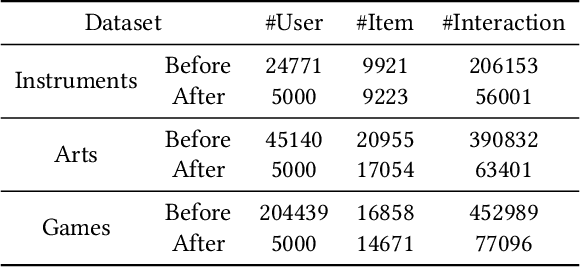
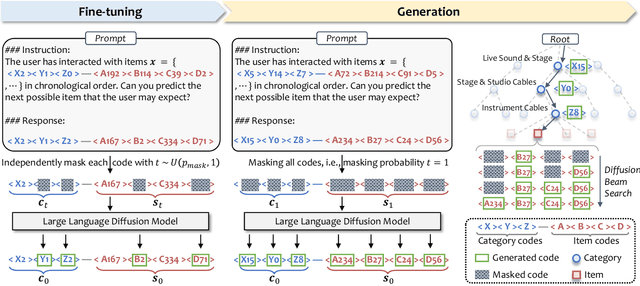

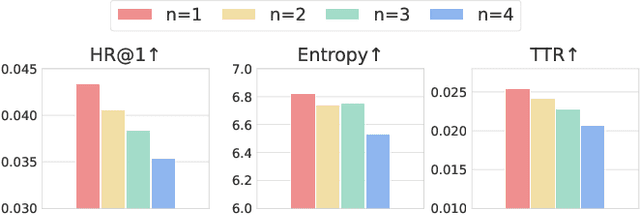
Abstract:Recent advancements in large language model-based recommendation systems often represent items as text or semantic IDs and generate recommendations in an auto-regressive manner. However, due to the left-to-right greedy decoding strategy and the unidirectional logical flow, such methods often fail to produce globally optimal recommendations. In contrast, human reasoning does not follow a rigid left-to-right sequence. Instead, it often begins with keywords or intuitive insights, which are then refined and expanded. Inspired by this fact, we propose MindRec, a diffusion-driven coarse-to-fine generative paradigm that emulates human thought processes. Built upon a diffusion language model, MindRec departs from auto-regressive generation by leveraging a masked diffusion process to reconstruct items in a flexible, non-sequential manner. Particularly, our method first generates key tokens that reflect user preferences, and then expands them into the complete item, enabling adaptive and human-like generation. To further emulate the structured nature of human decision-making, we organize items into a hierarchical category tree. This structure guides the model to first produce the coarse-grained category and then progressively refine its selection through finer-grained subcategories before generating the specific item. To mitigate the local optimum problem inherent in greedy decoding, we design a novel beam search algorithm, Diffusion Beam Search, tailored for our mind-inspired generation paradigm. Experimental results demonstrate that MindRec yields a 9.5\% average improvement in top-1 accuracy over state-of-the-art methods, highlighting its potential to enhance recommendation performance. The implementation is available via https://github.com/Mr-Peach0301/MindRec.
SeViCES: Unifying Semantic-Visual Evidence Consensus for Long Video Understanding
Oct 23, 2025Abstract:Long video understanding remains challenging due to its complex, diverse, and temporally scattered content. Although video large language models (Video-LLMs) can process videos lasting tens of minutes, applying them to truly long sequences is computationally prohibitive and often leads to unfocused or inconsistent reasoning. A promising solution is to select only the most informative frames, yet existing approaches typically ignore temporal dependencies or rely on unimodal evidence, limiting their ability to provide complete and query-relevant context. We propose a Semantic-Visual Consensus Evidence Selection (SeViCES) framework for effective and reliable long video understanding. SeViCES is training-free and model-agnostic, and introduces two key components. The Semantic-Visual Consensus Frame Selection (SVCFS) module selects frames through (1) a temporal-aware semantic branch that leverages LLM reasoning over captions, and (2) a cluster-guided visual branch that aligns embeddings with semantic scores via mutual information. The Answer Consensus Refinement (ACR) module further resolves inconsistencies between semantic- and visual-based predictions by fusing evidence and constraining the answer space. Extensive experiments on long video understanding benchmarks show that SeViCES consistently outperforms state-of-the-art methods in both accuracy and robustness, demonstrating the importance of consensus-driven evidence selection for Video-LLMs.
Contrastive Weak-to-strong Generalization
Oct 09, 2025
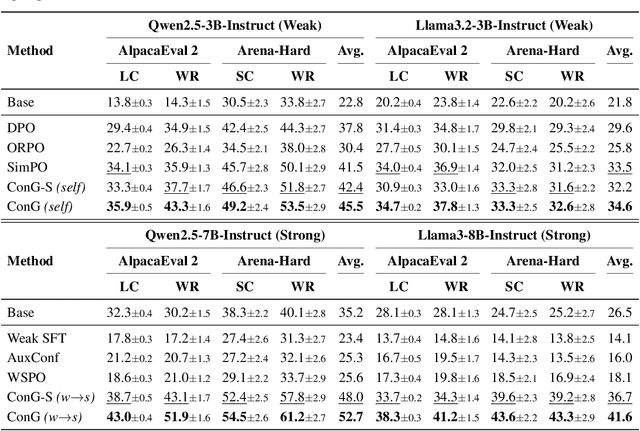
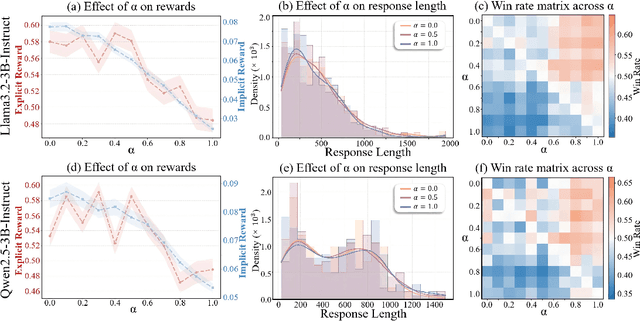
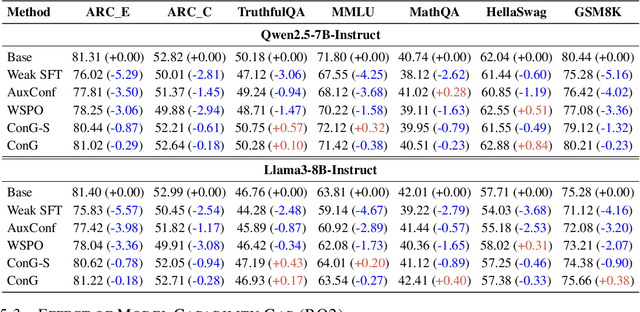
Abstract:Weak-to-strong generalization provides a promising paradigm for scaling large language models (LLMs) by training stronger models on samples from aligned weaker ones, without requiring human feedback or explicit reward modeling. However, its robustness and generalization are hindered by the noise and biases in weak-model outputs, which limit its applicability in practice. To address this challenge, we leverage implicit rewards, which approximate explicit rewards through log-likelihood ratios, and reveal their structural equivalence with Contrastive Decoding (CD), a decoding strategy shown to reduce noise in LLM generation. Building on this connection, we propose Contrastive Weak-to-Strong Generalization (ConG), a framework that employs contrastive decoding between pre- and post-alignment weak models to generate higher-quality samples. This approach enables more reliable capability transfer, denoising, and improved robustness, substantially mitigating the limitations of traditional weak-to-strong methods. Empirical results across different model families confirm consistent improvements, demonstrating the generality and effectiveness of ConG. Taken together, our findings highlight the potential of ConG to advance weak-to-strong generalization and provide a promising pathway toward AGI.
Quantile Advantage Estimation for Entropy-Safe Reasoning
Sep 26, 2025Abstract:Reinforcement Learning with Verifiable Rewards (RLVR) strengthens LLM reasoning, but training often oscillates between {entropy collapse} and {entropy explosion}. We trace both hazards to the mean baseline used in value-free RL (e.g., GRPO and DAPO), which improperly penalizes negative-advantage samples under reward outliers. We propose {Quantile Advantage Estimation} (QAE), replacing the mean with a group-wise K-quantile baseline. QAE induces a response-level, two-regime gate: on hard queries (p <= 1 - K) it reinforces rare successes, while on easy queries (p > 1 - K) it targets remaining failures. Under first-order softmax updates, we prove {two-sided entropy safety}, giving lower and upper bounds on one-step entropy change that curb explosion and prevent collapse. Empirically, this minimal modification stabilizes entropy, sparsifies credit assignment (with tuned K, roughly 80% of responses receive zero advantage), and yields sustained pass@1 gains on Qwen3-8B/14B-Base across AIME 2024/2025 and AMC 2023. These results identify {baseline design} -- rather than token-level heuristics -- as the primary mechanism for scaling RLVR.
 Add to Chrome
Add to Chrome Add to Firefox
Add to Firefox Add to Edge
Add to Edge